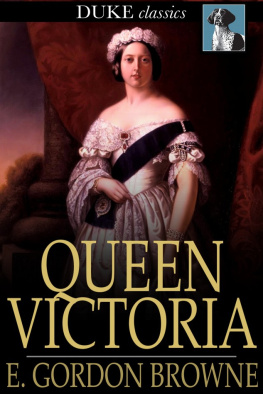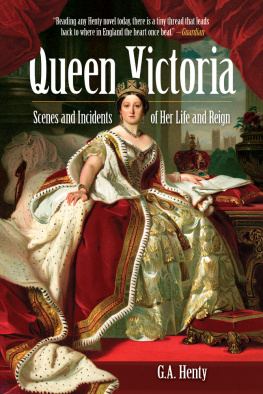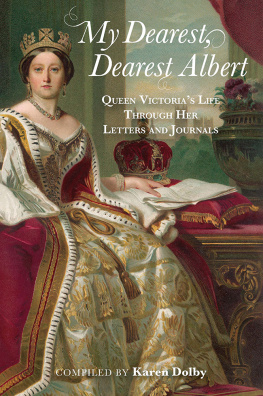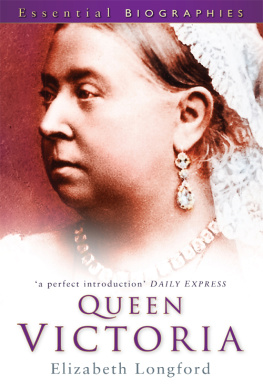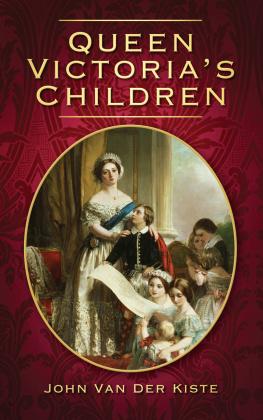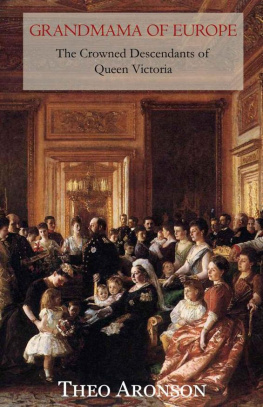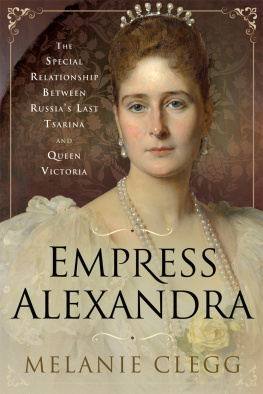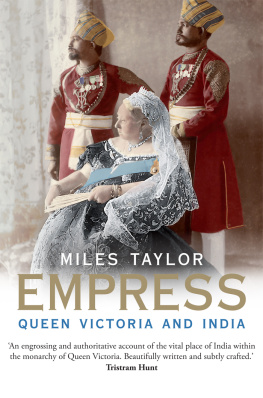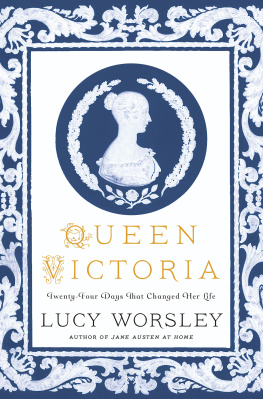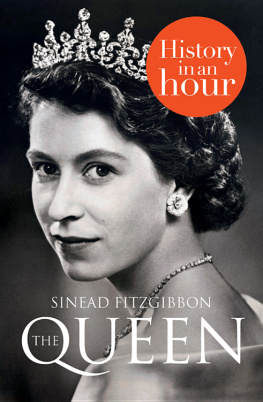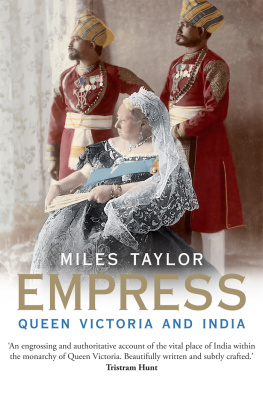QUEEN VICTORIA
* * *
E. GORDON BROWNE
*
Queen Victoria
First published in 1915
ISBN 978-1-62012-900-5
Duke Classics
2012 Duke Classics and its licensors. All rights reserved.
While every effort has been used to ensure the accuracy and reliability of the information contained in this edition, Duke Classics does not assume liability or responsibility for any errors or omissions in this book. Duke Classics does not accept responsibility for loss suffered as a result of reliance upon the accuracy or currency of information contained in this book.
Contents
*
Chapter I - A Look Back
*
In the old legend of Rip Van Winkle with which the American writerWashington Irving has made us so familiar, the ne'er-do-weel Ripwanders off into the Kaatskill Mountains with his dog and gun in orderto escape from his wife's scolding tongue. Here he meets the spectrecrew of Captain Hudson, and, after partaking of their hospitality,falls into a deep sleep which lasts for twenty years. The latter partof the story describes the changes which he finds on his return tohis native village: nearly all the old, familiar faces are gone;manners, dress, and speech are all changed. He feels like a strangerin a strange land.
Now, it is a good thing sometimes to take a look back, to try to countover the changes for good or for evil which have taken place in thiscountry of ours; to try to understand clearly why the reign of a greatQueen should have left its mark upon our history in such a way thatmen speak of the Victorian Age as one of the greatest ages that haveever been.
If an Elizabethan had been asked whether he considered the Queen ofEngland a great woman or not, he would undoubtedly have answered"Yes," and given very good reasons for his answer. It was not fornothing that the English almost worshipped their Queen in "thosespacious times of great Elizabeth." Edmund Spenser, one of theworld's great poets, hymned her as "fayre Elisa" and "the flowre ofVirgins":
Helpe me to blaze
Her worthy praise;
Which, in her sexe doth all excell!
Throughout her long reign, courtiers, statesmen, soldiers, andpeople all united in serving her gladly and to the best of theirpowers.
Yet she could at times prove herself to be hard, cruel, andvindictive; she was mean, even miserly, when money was wanted formen or ships; she was excessively vain, loved dress and finery, andwas often proud almost beyond bearing.
Notwithstanding all her faults, she was the best beloved of allEnglish monarchs because of her never-failing courage and strengthof mind, and she made the Crown respected, feared, and loved as noother ruler had done before her, and none other, save Queen Victoria,has reigned as she did in her people's hearts.
She lived for her country, and her country's love and admiration wereher reward. During her reign the seas were swept clear of foreignfoes, and her country took its place in the front rank of Great Powers.Hers was the Golden Age of Literature, of Adventure and Learning,an age of great men and women, a New England.
If an Elizabethan Rip Van Winkle had fallen asleep and awakened againat the opening of Victoria's reign, more than 200 years later, whatwould he have found? England still a mighty Power, it is true,scarcely yet recovered from the long war against Napoleon, withNelson and Wellington enthroned as the national heroes. But the timeswere bad in many ways, for it was "a time of ugliness: ugly religion,ugly law, ugly relations between rich and poor, ugly clothes, uglyfurniture."
The England of that day, it must be remembered, was the Englanddescribed so faithfully in Charles Dickens' early works. It was farfrom being the England we know now. In 1836 appeared the first numberof Mr Pickwick's travels. The Pickwick Papers is not a great workof humour merely, for in its pages we see England and the earlyVictoriansa strange country to usin which they lived.
It is an England of old inns and stagecoaches, where "manners androads were very rough"; where men were still cast into prison fordebt and lived and died there; where the execution of a criminal stilltook place in public; where little children of tender years werecondemned to work in the depths of coal-pits, and amid the clang androar of machinery. It was a hard, cruel age. No longer did the peoplelook up to and reverence their monarch as their leader. England hadyet to pass through a long and bitter period of 'strife and stress,'of war between rich and poor, of many and bewildering changes. Theintroduction of coal, steam, and mechanism was rapidly changing thecharacter of the whole country. The revenue had grown from about19,000,000 pounds in 1792 to 105,000,000 pounds in 1815, and thereseemed to be no limit to the national wealth and resources.
But these very changes which enriched some few were the cause ofmisery and poverty to struggling thousands. Machinery had ruined thespinning-wheel industry and reduced the price of cloth; the priceof corn had risen, and, after the close of the great war, othernations were free once again to compete against our country in themarkets where we so long had possessed the monopoly of trade.
The period which followed the year 1815 was one of incessant strugglefor reform, and chiefly the reform of a Parliament which nolonger represented the people's wishes. Considerably more than halfthe members were not elected at all, but were recommended by patrons.
The average price of a seat in Parliament was 5000 pounds for aso-called 'rotten borough.' Scotland returned forty-five membersand Cornwall forty-four members to Parliament! The reformers alsodemanded the abolition of the 'taxes on knowledge,' by which wasmeant the stamp duty of fourpence on every copy of a newspaper, aduty of threepence on every pound of paper, and a heavy tax uponadvertisements. The new Poor Laws aroused bitter discontent. Insteadof receiving payment of money for relief of poverty, as had formerlybeen the case, the poor and needy were now sent to the 'Union'workhouse.
A series of bad harvests was the cause of great migrations to thefactory towns, and the already large ranks of the unemployed grewgreater day by day. The poverty and wretchedness of the working classis painted vividly for us by Carlyle when he speaks of "half a millionhandloom weavers, working 15 hours a day, in perpetual inability toprocure thereby enough of the coarsest food; Scotch farm-labourers,who 'in districts the half of whose husbandry is that of cows, tasteno milk, can procure no milk'... the working-classes can no longergo on without government, without being actually guided andgoverned."
Such was Victoria's England when she ascended the throne, a younggirl, nineteen years of age.
Chapter II - Childhood Days
*
On the western side of Kensington Gardens stands the old Palace,built originally in the solid Dutch style for King William and Mary.The great architect, Sir Christopher Wren, made notable additionsto it, and it was still further extended in 1721 for George the First.
Within its walls passed away both William and his Queen, Queen Anneand her husband, and George the Second. After this time it ceasedto be a royal residence.
The charm of Kensington Gardens, with its beautiful walks andsecluded sylvan nooksthe happy hunting-ground of London childrenand the home of 'Peter Pan'has inspired many writers to sing itspraises:
In this lone, open glade I lie,
Screen'd by deep boughs on either hand;
And at its end, to stay the eye,
Those black-crown'd, red-boled pine trees stand!

